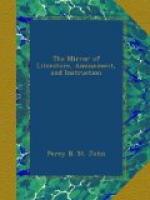Bewick’s powers of whistling appear to have been extraordinary. “His ear,” says the agreeable reminiscent already quoted, “(as a musical feeling is called) was so delicately acute, and his inflexorical powers so nice and rapid, that he could run in any direction or modulation, the diatomic or chromatic scale, and even split the quarter-notes of the enharmonic; neither of which, however, did he understand scientifically, though so consummately elegant his execution: and his musical memory was so tenacious that he could whistle through the melodies of whole overtures; and these, he said, he could obtain having once heard from the orchestra of a playhouse, or a holiday band, in both of which he took extreme delight.” Bewick’s contempt for luxury was remarkable. He generally slept, even in the depth of winter, with the windows of his chamber open, though in consequence he sometimes, on awakening, found the snow lying on his bed-clothes. For money, which men in general prize so highly, Bewick had all the indifference of a philosopher.
But we must let Mr. Dovaston tell Bewick’s last labours, and the close of his well-spent life:
“Having exhausted the quadrupeds and British birds as vehicles to his art, instruction, and amusements, he, late in life, took up a fervent resolution to engrave all the British Fishes, and write their histories. To this his mind was well trained, having been ever a lover of the fountains and rills, the still pools and broad waters, the majestic rivers and the mighty ocean. Here he felt the seeds of his talent stirring all a-life, where he should have to display the beauties of the finny tribe, and treat of the wonders of the great deep. When I was last in Northumberland, they showed me thirty fishes he had cut by way of trial, with the spirit and execution whereof himself was well satisfied, and his judicious friends enraptured; together with more than a hundred tail-pieces, conceived and cut, ‘ay, every inch,’ with all his usual imaginative appropriation and power. His art here got entirely into a new element; for, as he was forced to show the fishes out of water, he was deprived of his favourite excellence, motion; yet such motion as a fish new-landed has, he has given with elasticity and life: brilliance to the scaly, and lubricity to the smooth; so as to remind the naturalist of excellent old Chaucer’s touches of nature, where




